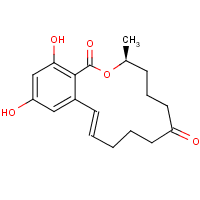Zearalenone
Agent Name
Zearalenone
CAS Number
17924-92-4
Formula
C18-H22-O5
Major Category
Biological Agents

Synonyms
(-)-Zearalenone; (10S)-Zearalenone; (S)-(-)-Zearalenone; (S)-Zearalenone; 6-(10-Hydroxy-6-oxo-trans-1-undecenyl)-beta-resorcylic acid lactone; Benzoxacyclotetradec-11-en-1-one, 14,16-dihydroxy-3-methyl-7-oxo-, trans-; Compound F-2; F-2 toxin; FES; Mycotoxin F2; Resorcylic acid, 6-(10-hydroxy-6-oxo-1-undecenyl)-, mu-lactone, trans-; Toxin F2; Zenone; trans-Zearalenone; (S-(E))-3,4,5,6,9,10-Hexahydro-14,16-dihydroxy-3-methyl-1H-2-benzoxacyclotetradecin-1,7(8H)-dione; 1H-2-Benzoxacyclotetradecin-1,7(8H)-dione, 3,4,5,6,9,10-hexahydro-14,16-dihydroxy-3-methyl-, (3S,11E)-; [ChemIDplus]
Category
Mycotoxins
Description
Solid; [Merck Index] White solid; [CAMEO] White powder; [MSDSonline]
Sources/Uses
Estrogenic mycotoxin from Fumaris fungi (found in grains); [Merck Index] Used as intermediate for zeranol and its 7-hydroxy epimer and as a veterinary anabolic agent; [HSDB] The mycotoxins zearalenone, deoxynivalenol, and fusarenon X are produced by the fungi Fusarium graminearum, F. culmorum, and F. crookwellense; [IARC] A synthesized form, called zeranol (Ralgro), was used as an anabolic agent in sheep and cattle; [Reference #1]
Comments
"One of a group of compounds known under the general designation of resorcylic acid lactones. Cis, trans, dextro and levo forms have been isolated from the fungus Gibberella zeae (formerly Fusarium graminearum). They have estrogenic activity, cause toxicity in livestock as feed contaminant, and have been used as anabolic or estrogen substitutes." [ChemIDplus] A tissue irritant; [CAMEO] Not a toxin, but a mycoestrogen; Concentrations as low as 1 ppm contaminating animal feed may lead to hyperestrogenic syndromes in pigs, cattle, and sheep; [Reference #1] A corrosive substance that can cause injury to the skin, eyes, and respiratory tract; Inhalation may cause chemical pneumonitis; A reproductive hazard; [Aldrich MSDS]
Restricted
Zeranol was banned by the EU in 1989; [Reference #1]
Reference Link #1
Biomedical References
Adverse Effects
Toxic Pneumonitis
Yes
Dermatotoxin
Skin burns
IARC Carcinogen
Not classifiable
Diseases, Processes, and Activities Linked to This Agent
Processes
Industrial Processes with risk of exposure: